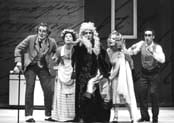OPERA SEARCH

Il Signor Fagotto (OEK critical edition)
(1864)Libretto by Charles Nuitter and Etienne Tréfeu; original German version by Karl Treumann; new English version by Richard Duployen (F,G,E)
2S,2T,Bar,B;
Original scoring: 2(II=picc).2.2.2-4.2.3.0-timp.perc-strings;
Reconstructed Parisian scoring: 2(II=picc).1.2.1-2.2.1.0-timp.perc-strings
Abbreviations (PDF)
Boosey & Hawkes / Bote & Bock
Bouffes-Parisiens, Paris
Company: unknown
Opéra, Lyon
Caio Gaiarsa, director
Conductor: Olivier Reboul
Company: Opéra national de Lyon
| BERTOLUCCI, a music lover | Tenor |
| BACOLO, his servant | Tenor |
| CARAMELLO, an antique dealer | Baritone |
| FABRICIO, Clorinda's lover | Bass |
| CLORINDA, Bertolucci's daughter | Soprano |
| MOSCHETTA | Soubrette Soprano |
A bourgeouis salon in the 19th century
The music lover Bertolucci wants his daughter Clorinda to marry the antiquarian Caramello, who has a sound knowledge of true classical music and is a member of the 'National Academy of Pompeian Amphores'! Clorinda, however, is in love with her music teacher, the young composer Fabricio, though his art is not acceptable to Bertolucci's ears. Bertolucci has invited the brilliant musician Fagotto, whom he adores, to be a witness to his wedding. Fagotto appears and displays his distinctly circus-like skills. He is a master of the descriptive, a genius of the imitation of natural and other sounds. Nobody notices, however, that Fagotto is not the real Fagotto but the disguised lackey Bacolo, who wants to exploit Bertolucci's blind adoration in order to talk him out of making Caramello his son-in-law and, last not least, to get his beloved Moschetta … The musical case of mistaken identity leads to total confusion when, following Caramello's performance of a Pindaric ode, Bacolo (alias Fagotto) renders a piece from his new composition (which is in truth by Fabricio...). Bertolucci is in rapture, Caramello upset. When the quarrel between Fagottists and Caramellists comes to blows, Bacolo loses his wig and the masquerade comes to light. Being a parody not of current fashion but rather of all musical sectarianism, this early one-act operetta of Offenbach is a masterpiece of satirical characterization as well, half-way between Rossini and Dada.
Comic
